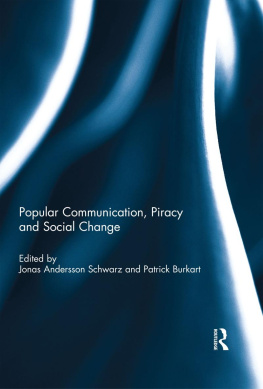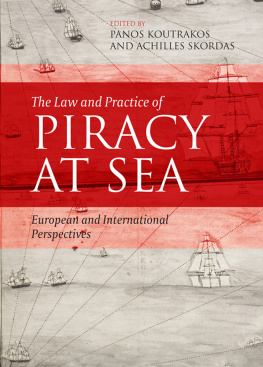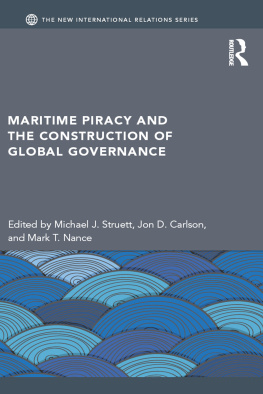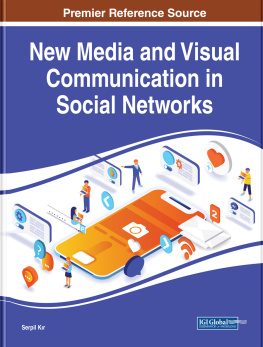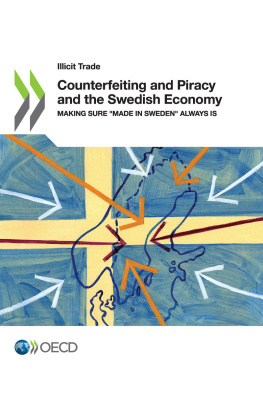Popular Communication, Piracy and Social Change
Digital piracy cultures and peer-to-peer technologies combined to spark transformations in audio-visual distribution between the late 1990s and the mid-2000s. Digital piracy also inspired the creation of a global anti-piracy law and policy regime, and counter-movements such as the Swedish and German Pirate Parties. These trends provide starting points for a wide-ranging debate about the prospects for deep and lasting changes in social life enabled by piratical technology practices. This edited volume brings together contemporary scholarship in communication and media studies, addressing piracy as a recombinant feature of popular communication, technological innovation, and communication law and policy. An international collection of contributors highlights key debates about piracy, popular communication, and social change, and provides a lasting resource for global media studies.
This book was originally published as a special issue of Popular Communication: The International Journal of Media and Culture.
Jonas Andersson Schwarz is Senior Lecturer in Media and Communication at Sdertrn University, Sweden. He specializes in digital media cultures and technologies, and how these are structurally conditioned.
Patrick Burkart is Professor of Communication at Texas A&M University, College Station, TX, USA. He researches information law and policy, political economy, and popular communication, and is co-editor-in-chief of Popular Communication: The International Journal of Media and Culture.
Popular Communication, Piracy and Social Change
Digital piracy cultures and peer-to-peer technologies combined to spark transformations in audio-visual distribution between the late 1990s and the mid-2000s. Digital piracy also inspired the creation of a global anti-piracy law and policy regime, and counter-movements such as the Swedish and German Pirate Parties. These trends provide starting points for a wide-ranging debate about the prospects for deep and lasting changes in social life enabled by piratical technology practices. This edited volume brings together contemporary scholarship in communication and media studies, addressing piracy as a recombinant feature of popular communication, technological innovation, and communication law and policy. An international collection of contributors highlights key debates about piracy, popular communication, and social change, and provides a lasting resource for global media studies.
This book was originally published as a special issue of Popular Communication: The International Journal of Media and Culture.
Jonas Andersson Schwarz is Senior Lecturer in Media and Communication at Sdertrn University, Sweden. He specializes in digital media cultures and technologies, and how these are structurally conditioned.
Patrick Burkart is Professor of Communication at Texas A&M University, College Station, TX, USA. He researches information law and policy, political economy, and popular communication, and is co-editor-in-chief of Popular Communication: The International Journal of Media and Culture.
First published 2017
by Routledge
2 Park Square, Milton Park, Abingdon, Oxon, OX14 4RN, UK
and by Routledge
711 Third Avenue, New York, NY 10017, USA
Routledge is an imprint of the Taylor & Francis Group, an informa business
2017 Taylor & Francis
All rights reserved. No part of this book may be reprinted or reproduced or utilised in any form or by any electronic, mechanical, or other means, now known or hereafter invented, including photocopying and recording, or in any information storage or retrieval system, without permission in writing from the publishers.
Trademark notice: Product or corporate names may be trademarks or registered trademarks, and are used only for identification and explanation without intent to infringe.
British Library Cataloguing in Publication Data
A catalogue record for this book is available from the British Library
ISBN 13: 978-1-138-20419-5
Typeset in Times New Roman
by RefineCatch Limited, Bungay, Suffolk
Publishers Note
The publisher accepts responsibility for any inconsistencies that may have arisen during the conversion of this book from journal articles to book chapters, namely the possible inclusion of journal terminology.
Disclaimer
Every effort has been made to contact copyright holders for their permission to reprint material in this book. The publishers would be grateful to hear from any copyright holder who is not here acknowledged and will undertake to rectify any errors or omissions in future editions of this book.
Contents
Citation Information
The following chapter was originally published in Popular Communication: The International Journal of Media and Culture, volume 9, issue 2 (May 2011). When citing this material, please use the original page numbering for each article, as follows:
Chapter 1
Mobility Through Piracy, or How Steven Seagal Got to Malawi
Jonathan Gray
Popular Communication: The International Journal of Media and Culture, volume 9, issue 2 (May 2011), pp. 99113
The following chapters were originally published in Popular Communication: The International Journal of Media and Culture, volume 13, issue 1 (March 2015). When citing this material, please use the original page numbering for each article, as follows:
Introduction
Piracy and Social Change
Jonas Andersson Schwarz and Patrick Burkart
Popular Communication: The International Journal of Media and Culture, volume 13, issue 1 (March 2015), pp. 15
Chapter 2
Honorable Piracy and Chiles Digital Transition
Jennifer Ashley
Popular Communication: The International Journal of Media and Culture, volume 13, issue 1 (March 2015), pp. 617
Chapter 3
Piracy, Geoblocking, and Australian Access to Niche Independent Cinema
Rebecca Beirne
Popular Communication: The International Journal of Media and Culture, volume 13, issue 1 (March 2015), pp. 1831
Chapter 4
Anti-Market Research: Piracy, New Media Metrics, and Commodity Communities
Jeremy Wade Morris
Popular Communication: The International Journal of Media and Culture, volume 13, issue 1 (March 2015), pp. 3244
Chapter 5
The Piratical Ethos in Streams of Language
Justin Lewis
Popular Communication: The International Journal of Media and Culture, volume 13, issue 1 (March 2015), pp. 4561
Chapter 6
The Media Archaeology of File Sharing: Broadcasting Computer Code to Swedish Homes
Jrgen Skgeby
Popular Communication: The International Journal of Media and Culture, volume 13, issue 1 (March 2015), pp. 6273
Chapter 7
Anonymous and the Political Ethos of Hacktivism
Luke Goode
Popular Communication: The International Journal of Media and Culture, volume 13, issue 1 (March 2015), pp. 7486
For any permission-related enquiries please visit:
http://www.tandfonline.com/page/help/permissions

